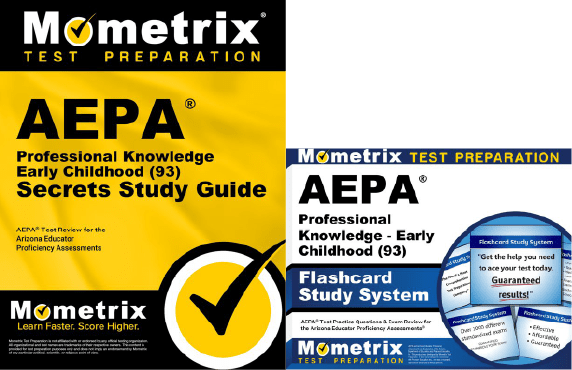If you need help studying for the AEPA Professional Knowledge—Early Childhood test or just want some more information about what the test is like, you’ve come to the right place!
Click below to take a free AEPA Professional Knowledge—Early Childhood practice test!
What’s on the Test?
First, let’s talk about the questions on the AEPA Professional Knowledge—Early Childhood test. There are 103 questions in total, most being selected-response and some being constructed-response.
100 questions
Selected-response questions require you to select the correct answer from a list of options. Multiple-choice questions are the most common example, but you may also see true-or-false questions and “matching” questions, which ask you to match terms or concepts with their definitions.
Constructed-Response (CR)
3 questions
The constructed-response questions require you to write your answer instead of selecting from a list of choices. Your response to these questions is generally expected to be at least a few paragraphs, but you’ll be given specific details and instructions before you take the test.
The time limit for each subtest is 3.5 hours, and you’ll be able to take restroom breaks as needed (just know that the timer won’t stop!).
Let’s take a closer look at each section of the exam:
1. Foundations of Early Childhood Education
28% of the exam
- Foundations of the early childhood profession
- Code of ethical conduct
- Issues and trends that affect early childhood programs
- Professional roles and expectations
- The rights and responsibilities of early childhood educators
- Processes by which young children learn
2. Promoting Child Development and Learning
36% of the exam
- Creating and sustaining responsive and respectful learning environments
- Procedures and factors in planning learning goals and experiences
- Appropriate instructional methodologies
- Providing effective experiences that promote young children’s learning and development
- Using various assessment strategies
- Monitoring children’s progress
- Modifying teaching to enhance development and learning
3. Child Guidance and Inclusive Learning Communities
18% of the exam
- Positive guidance and socialization strategies
- Human diversity
- Creating an inclusive learning community that is responsive to all children
4. Family and Community Relationships
18% of the exam
- The roles of families in early childhood programs
- Engaging families in achieving goals for children
- Establishing and sustaining effective relationships with families, professionals, and community agencies
How to Register
To register for the test, you’ll need to create an account on the NES website. Once your account has been created, you can register to take the exam.
How the Exam is Scored
The AEPA Professional Knowledge—Early Childhood test is scored using a scaled scoring method. Here’s how it works:
Scaled Scoring
For every question you answer correctly, you get one point added to your raw score. At the end of the test, your final raw score will be converted to a scaled score ranging from 100 to 300.
The reason your raw score is converted to a scaled score is because everyone that takes the test is given a slightly different set of questions. Since everyone has a different arrangement of questions, and because some questions are harder than others, converting your raw score to a scaled score ensures a more even playing field.
Retaking the Exam
If you don’t get the score you want on your first try, that’s okay! You can take the exam again after a mandatory 30-day waiting period.
FAQs
How many questions are on the AEPA Professional Knowledge—Early Childhood exam?
The exam contains 103 questions.
What is the time limit for the AEPA Professional Knowledge—Early Childhood exam?
The exam is timed at 3.5 hours.
What is the passing score for the AEPA Professional Knowledge—Early Childhood exam?
You’ll need to get a final scaled score of at least 240 to pass.
How much does the AEPA Professional Knowledge—Early Childhood exam cost?
The testing fee is $145.
AEPA and Arizona Educator Proficiency Assessments are trademarks of the Arizona Department of Education and Pearson Education, Inc. This product was developed by Mometrix Test Preparation. It was not developed in connection with Pearson Education, Inc., nor was it reviewed, approved or endorsed by these agencies.



 AEPA Study Guide
AEPA Study Guide AEPA Flashcards
AEPA Flashcards